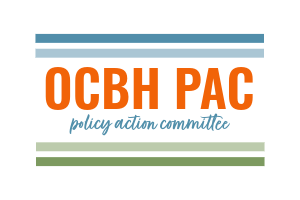| |
|
|
| |
LEGISLATIVE ACTION
|
|
| |
OCBH advocates for a legislative agenda that ensures Oregonians have access to treatment and care for the following reasons:
- Substance Use Disorder is a treatable and preventable disease.
- Families and individuals have the right to quality community services.
- Prevention and treatment services save lives and strengthen families.
- Partnerships and collaboration are crucial for success.
Our voice unites prevention, education, and treatment providers with mainstream healthcare, other behavioral health and social service providers, the criminal justice system, state agencies, and organizations committed to reducing the stigma associated with substance use disorders.
OCBH actively engages with the state legislature to educate on issues affecting those we serve. We advocate for an improved service system and necessary funding, striving to enhance our community's SUD treatment and prevention landscape and foster healthy communities.
|
|
| |
|
|
| |
WHAT WE'VE ACCOMPLISHED
|
|
| |
Funding Achievements:
- Successfully passed HB 4004, allocating $132.2 million in retention and recruitment funds exclusively for Behavioral Health (BH) providers.
- Utilized a non-competitive grant allocation method based on existing employment costs.
- Enforced a timeline mandating funds disbursement by May 31st, 2022.
- Ensured that all providers received their grants by the specified deadline, enabling significant recruitment and retention incentives.
- Designated 25% of grants for other workforce stabilization initiatives.
- Implemented the most substantial rate increase ever seen in the sector, at 30%.
- This rate increase cost the state $61 million from the General Fund.
- Leveraged an additional $169 million in federal funds, resulting in a total investment of $230 million, per OHA's estimates.
- A cumulative allocation of $362.2 million in additional resources for behavioral health providers.
Other Achievements:
- Successfully passed legislation to safeguard the interests of organizations operating sobering centers.
- Devoted attention to the matter of Institutions for Mental Diseases (IMD).
|
|
| |
To learn about how you can support OCBH's legislative activity and the OCBH PAC, click the link below.

|
|
| |
|
|
| |
MEET OUR LOBBYING TEAM
|
|
| |

|
|

|
|
| |
Cassie Bruske, Lobbyist / Account Manager
|
|
Jon Eames, Lobbyist
|
|
| |
Cassie's experience in the world of elections allows her to work closely with clients and policymakers to make the connections necessary to advocate for change. As Congressman Kurt Schrader’s Campaign Manager, Cassie worked closely with community leaders and local elected officials across Oregon’s politically diverse 5th congressional district. She also served as a Deputy Finance Director for former Governor Kitzhaber, collaborating with a regionally diverse network of Oregon’s diverging constituencies toward the common goal of his ultimately successful reelection.
|
|
Jon is an experienced leader in government affairs, media relations, and public relations in Oregon and Washington State. With over 17 years of experience in the political arena, he brings a wealth of in-depth knowledge of the legislative process and has outstanding working relationships with elected officials, staff, and key state policy makers. |
|
| |
|
|
| |
CURRENT CHALLENGES
|
|
| |
The Substance Use Disorder treatment and prevention system faces critical challenges, being both underfunded and largely disconnected from the mainstream of healthcare delivery. Despite the acknowledgment of alcohol and drug use problems as significant contributors to healthcare costs in Oregon, they frequently go undiagnosed. The provision of care remains fragmented and inadequate due to the reliance on outdated funding models within the public sector. A consistent system for intervening and triaging individuals into treatment is notably absent. Furthermore, innovation and integration efforts have struggled to attain effectiveness, often hindered by inadequate funding and insufficient prominence within the formulation of our current health policies and practices.
It is imperative to recognize that prevention and treatment not only save lives but also reduce healthcare expenditures.
|
|
|